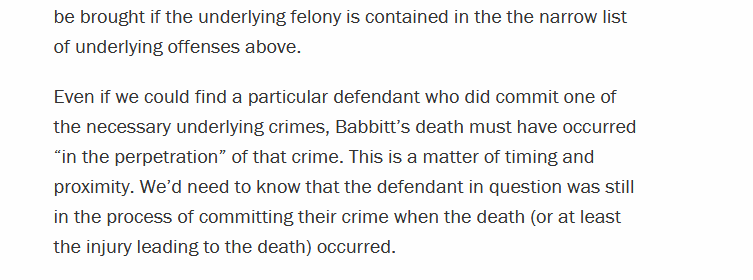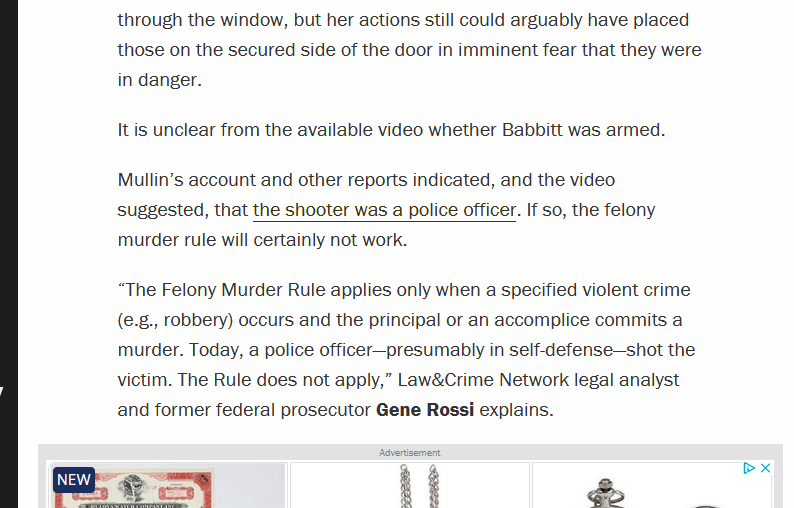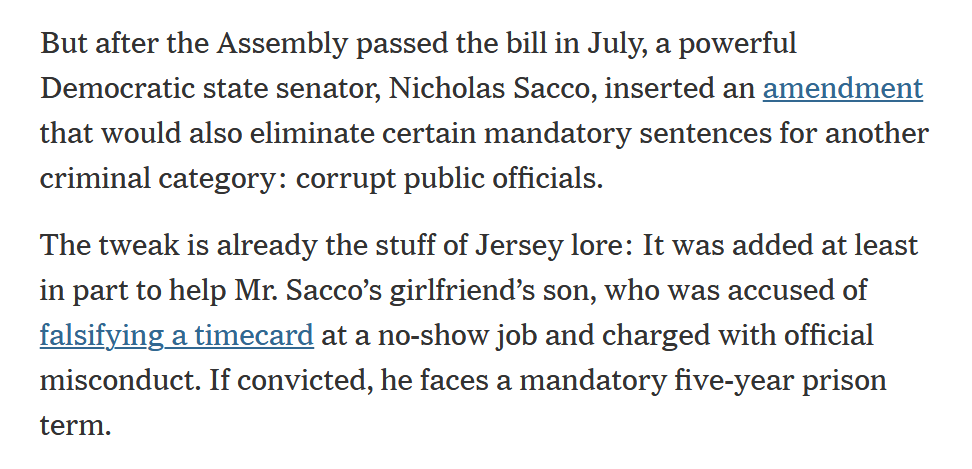
So strange that Law & Crime article questioning whether the Capitol rioters could be prosecuted for felony murder and it *never discusses* the most obvious predicate felony—burglary
lawandcrime.com/legal-analysis… via @lawcrimenews
lawandcrime.com/legal-analysis… via @lawcrimenews
As I will be teaching my first year criminal law students later this semester, felony murder is often a question of charging strategy for prosecutors. The defendant has often multiple felonies, some of which trigger felony murder and some of which don’t.
This article makes the classic mistake of analyzing only one possible underlying felony—sedition—and not the other, more mundane felonies, including burglary.
It’s the sort of error that loses students a lot of points on their final exam!
It’s the sort of error that loses students a lot of points on their final exam!
This basic error--misidentifying the relevant predicate felony--ends up affecting the other analysis in the article. For example, the author correctly points out that there are some other Qs that must be answered for felony murder to apply. 



This analysis looks different if we are talking about burglary---which the Supreme Court defines not only as entering a building to commit a crime, but also remaining in the building.
That's going to make the "remoteness" inquiry pretty easy, not complicated as the article says.
That's going to make the "remoteness" inquiry pretty easy, not complicated as the article says.
To be fair to the article, it does mention one legal issue that could prevent prosecutors from obtaining a conviction for the death of Ashli Babbitt---the fact that she was killed by police, rather than her fellow rioters (and burglars).
But even here, the article's got problems.
But even here, the article's got problems.
Jurisdictions are actually split on whether a police officer killing one of the people committing a felony can result in a felony murder conviction for the other people who were committing that same felony.
Again, this is an issue that we teach in 1st year criminal law.
Again, this is an issue that we teach in 1st year criminal law.
This article suggests that the fact that the police officer did the killing makes it impossible to bring a felony murder charge. But that's not true. It depends on the specific case law that's been developed in a jurisdiction. 

The article should have talked about what federal court opinions say about this issue. And the mere fact that the article quotes a federal prosecutor (who speaks about the "rule" and not about cases) doesn't make me more confident. I imagine most AUSAs haven't handled a FM case.
The sloppy legal analysis in this article is compounded by the fact that the whole article was framed as trying to criticize people on Twitter who said felony murder did or should apply.
Maybe they were wrong, but this article certainly didn't make the case for it.
Maybe they were wrong, but this article certainly didn't make the case for it.
Also, I question the journalistic decision to write an article about why some people's comments about the law are wrong without *asking those people* to explain and/or defend what they've said. Interviewing some other folks doesn't seem like it really gets the job done.
Let me add that many of the @lawcrimenews stories that I've seen are just an aggregation of tweets.
I'm no journalism expert, but that doesn't strike me as a helpful way to inform readers.
Why not call the people who are tweeting about things for a more thoughtful quote?
I'm no journalism expert, but that doesn't strike me as a helpful way to inform readers.
Why not call the people who are tweeting about things for a more thoughtful quote?
At a minimum, if your publication is literally called "Law & Crime," I would hope that your articles are actually getting the law about crimes correct.
This one made a pretty basic application error--an error that could have easily been fixed with some slightly better reporting.
This one made a pretty basic application error--an error that could have easily been fixed with some slightly better reporting.
• • •
Missing some Tweet in this thread? You can try to
force a refresh



